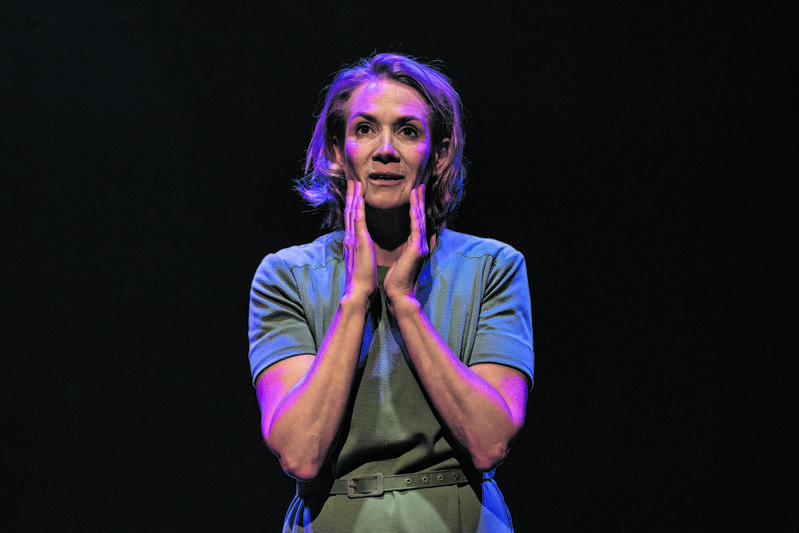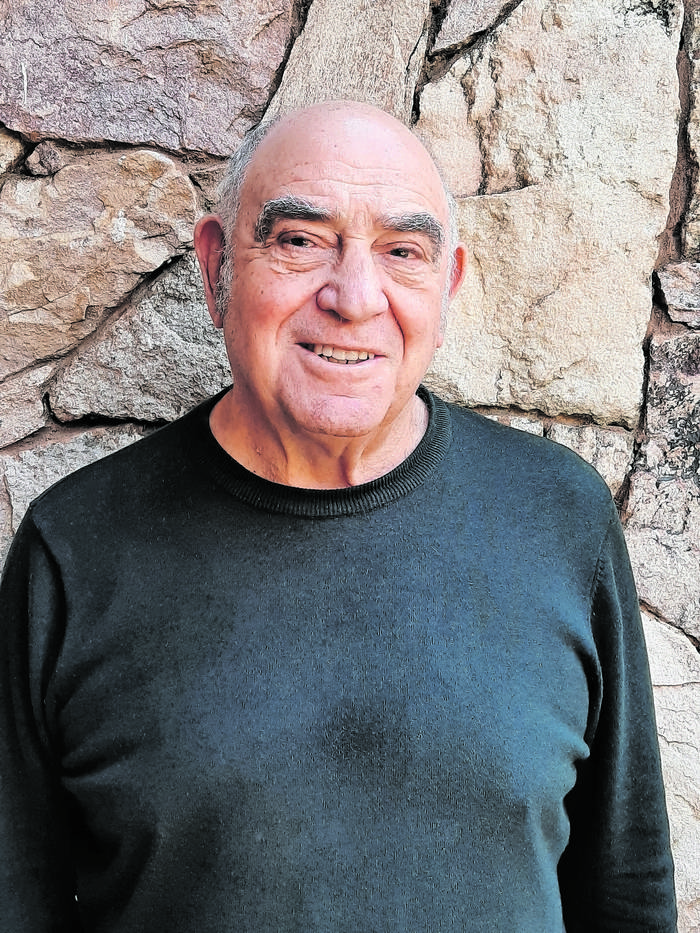Stark: Paul du Toit’s The Unlikely Secret Agent
Even before the lights at The Market Theatre were dimmed for the play to start, the songs playing were subtly transporting us to Durban in 1963 where The Unlikely Secret Agent is set.
First, the typical 1950s close-harmony hit Mr Sandman by The Chordettes floats us back through the decades, followed by the Rolling Stones’ 19th Nervous Breakdown and Patsy Cline’s Crazy, both hinting at the unsettling places the story was going to take us.
As interval starts, another excellent choice — the South African protest song from the 1960s Master Jack by Four Jacks and a Jill — its lyrics, “it’s a strange, strange world we live in”, so true and relevant.
During the show, Miriam Makeba’s commanding musical warning, Beware, Verwoerd! (Ndodemnyama) had the same effect.
Directed and written by award-winning actor, director and playwright Paul du Toit, The Unlikely Secret Agent tells the story of Eleanor, an unassuming young single mother who works at Giggs Bookstore in Durban.
It is a paranoid time in Verwoerd’s apartheid republic. The police’s notorious Security Branch are on the hunt for Eleanor’s lover, who is in the banned ANC. He is the activist and — depending on who’s asking, telling or interrogating you — the “terrorist” “Red” Ronnie Kasrils.
It is a love story and a political thriller but with enough humour to counter the darkness and depravity of the interrogation scenes.
Eleanor, powerfully played by the exceptional Erika Breytenbach-Marais, is getting more deeply and directly involved in the underground struggle against the apartheid state.
And it is very dramatic. There is the destruction of electricity pylons near Pinetown that shrouds Durban in darkness, the bombing of the Central Post Office and an explosion at the Security Branch offices in the city’s Baker Street.
“Am I a terrorist?” she asks Kasrils.
“No, a secret agent,” replies the delightfully cast Wessel Pretorius. He even has similar bushy eyebrows to the real man and good Joburg boykie accent to boot.
The communist Kasrils, ironically enough, worked at the ad agency Lintas at the time.
“I’m a contradiction,” the character says knowingly, because “I have a way with words.”
But the fine young actor does not only shine in the Ronnie role. Dressed in dark suits, Pretorius, with Sanda Shandu, Ntlanhla Kutu and De Klerk Oelofse, play a range of challenging characters with aplomb.
In one scene, they camp it up as a bunch of white liberals mouthing typical white liberal platitudes.
Next, they are spooked ANC underground activists on the run; in a later scene they are inmates in the mental institution where Eleanor manages to get herself incarcerated as part of her plan to escape.
Kutu is truly believable as a Zulu woman who works in the institution as a cleaner and who helps Eleanor to freedom.
But the best — or is it the worst? — is when the foursome play the menacing Security Branch cops who have detained Eleanor.
Though she comes under intense pressure during interrogation, Eleanor has her own secret to conceal. As a clandestine agent for the underground ANC, she must protect her handlers and Kasrils at all costs.
 Erika Breytenbach-Marais plays Eleanor Kasrils in The Unlikely Secret Agent.
Erika Breytenbach-Marais plays Eleanor Kasrils in The Unlikely Secret Agent.
They obsess about Kasrils being a Jew and a communist. They also do the good-cop, bad-cop schtick, because they are cops, after all: “Do you realise he’s using you?” and “You’re better than that — you’re a Christian,” versus “It’s just a matter of time before your boyfriend takes a bullet,” and “You’re a fucking waste of a white skin!”
Outstanding is the moustached Oelofse who, to chilling effect, plays the notorious Lieutenant Grobler [see sidebar], a brooding baby-faced believer in the apartheid cause; one with a volcanic temper and a proclivity for sexual abuse — it becomes almost unwatchably tense when the other police officers leave him alone in the detention cell to “deal” with Eleanor.
As counterpoint, his colleague, Major Steenkamp (played suavely by Shandu) does the smoother “good cop” afterwards and explains: “His questioning can, shall we say, sometimes be a bit robust …”
The sparseness of the stage — bordered with just a filing cabinet, a desk and four chairs in a row for the four Security Branch men — enhances the drama. The focus is on the phenomenal actors, with efficient, pinpoint lighting and limited, but effective, sound effects augmenting only when necessary.
Right at the end, visuals are projected on the wall to tie it all up, including celebrating Eleanor Kasrils, who died on 8 November 2009 at the age of 73, after a long life in pursuit of justice for all South Africa’s people.
The Unlikely Secret Agent runs until 2 June at The Market Theatre in Johannesburg.
‘There are parts of the play that make me want to weep’
Ronnie Kasrils wears his heart on his sleeve. Last Friday night, he went to the opening of the play about his late wife Eleanor, The Unlikely Secret Agent, at The Market Theatre in Johannesburg.
It’s the first run in Gauteng of the play, written and directed by Paul du Toit. It was first staged at The Drama Factory in Somerset West in June 2021, and then at Cape Town’s Artscape and Baxter theatres the following year.
Kasrils has seen The Unlikely Secret Agent about 10 times. I ask the former intelligence minister, ANC activist and MK underground leader what it is like, whether he has got used to its impact.
“It just blows me away every time,” he says in an interview this week. “Certain parts of the play grab me by the throat — it catches me so strongly; it moves me …”
International relations minister and former cabinet colleague Naledi Pandor sat next to him at the Joburg opening night.
“She saw how it shook me, how it moved me strongly, and she just held my hand.”
The play is set in Durban in 1963, when Eleanor was detained by the police’s Security Branch and Kasrils was on the run. “There are certain parts of the play that make me want to weep,” he says. “It takes me back to a seminal part of our lives, of Eleanor’s and my lives.”
 Page through: The play The Unlikely Secret Agent is based on former ANC activist Ronnie Kasrils’ book.
Page through: The play The Unlikely Secret Agent is based on former ANC activist Ronnie Kasrils’ book.
The idea of turning Kasrils’ book The Unlikely Secret Agent into a play came from the actor who plays Eleanor, Erika Breytenbach-Marais.
“She read the book and fell in love with it,” he says.
Breytenbach-Marais interested the award-winning Du Toit in Eleanor’s story and he wrote the play after intensive research.
“With them both around 45 years old, they needed to find out about life in the sixties in Durban, the music, the movies, buses, cars, houses … and then the Security Branch and the politics of the time, the laws, including the 90-day Detention Act, which they wanted to understand.”
One of the characters in the play — all based on real people — is the notorious Security Branch cop, a Lieutenant Grobler, who in the 1960s broke up an ANC underground cell in Natal and later that decade a Swapo unit in Namibia.
He was particularly brutal towards Eleanor when she was detained in Durban, before being incarcerated at Fort Napier Hospital in Pietermaritzburg.
“I didn’t think Eleanor would manage to escape but she was smart and managed to … with the help of a black cleaner who unlocked the back door for five minutes early one morning.”
Grobler was clearly a troubled man. “In 1970, when we were in exile in London, I got a letter with a newspaper clipping in it that said Grobler had blown his brains out,” Kasrils says.
Du Toit rewrote the script several times before he was happy to rehearse and stage it. The three-week run at The Drama Factory was cut short by a week because all the actors came down with Covid.
“Luckily, very mild,” says Kasrils. He and his partner Amina Frense weren’t as fortunate but recovered well to see the play win numerous awards, including a Fleur Du Cap for best director in 2022.
The actors are heading to London’s Marylebone Theatre in August. Knowing Kasrils, he will make a plan to see it there, obviously to support the magnificent performers — but also to catch a match of his beloved football team Arsenal.